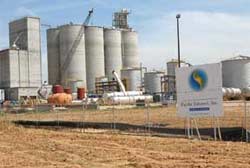U.S. Department of Energy (DOE) Secretary Samuel W. Bodman today announced that DOE will invest up to $114 million, over four years, (Fiscal Years 2007-2010) for four small-scale biorefinery projects to be located in Commerce City, Colorado; St. Joseph, Missouri; Boardman, Oregon; and Wisconsin Rapids, Wisconsin. Building on President Bush’s goal of making cellulosic ethanol cost-competitive by 2012, these ten-percent of commercial-scale biorefineries will use a wide variety of feedstocks and test novel conversion technologies to provide data necessary to bring online full-size, commercial-scale biorefineries. On average, commercial-scale biorefineries input 700 tons of feedstock per day, with an output of approximately 20-30 million gallons a year (MMGY); these small-scale facilities will input approximately 70 tons of feedstock per day, with an estimated 2.5 MMGY.
Due to an overwhelming response to this solicitation, the Department anticipates selecting a second round of small-scale projects later this spring, bringing DOE total investment up to $200 million should a second round of selections be made. Secretary Bodman made today’s announcement while delivering keynote remarks at the U.S. Chamber of Commerce Biofuels Dialogue Series, “Outlook for an Emerging Global Biofuels Market.”
“These project proposals were innovative and represent the geographic diversity that we strive for when making the widespread use of clean, renewable fuels commercially viable,” Secretary Bodman said. “Spurred by the President’s ambitious plan to reduce projected U.S. gas consumption by twenty percent by 2017, our goal is to aggressively push these technologies forward to get them out into the marketplace as quickly as possible, so they can have a real impact. Advanced biofuels offer tremendous promise for helping our nation to bring about a new, cleaner, more secure and affordable energy future.”
Expected to be operational in four years, the selected small-scale biorefineries projects will produce liquid transportation fuels such as cellulosic ethanol, as well as bio-based chemicals and bio-based products used in industrial applications. Combined with industry cost share, more than $331 million will be invested in these four projects. DOE is also working with these companies, and other research partners, to develop methods for reducing water and fertilizer needs associated with production of these fuels. With all of these projects, the amount of fossil fuel used to produce the biofuels is significantly less than that associated with gasoline – on average as much as 90 percent less over the lifecycle.
Today’s announcement is part of over $1 billion DOE has announced within the last year for multi-year biofuels research and development projects.

